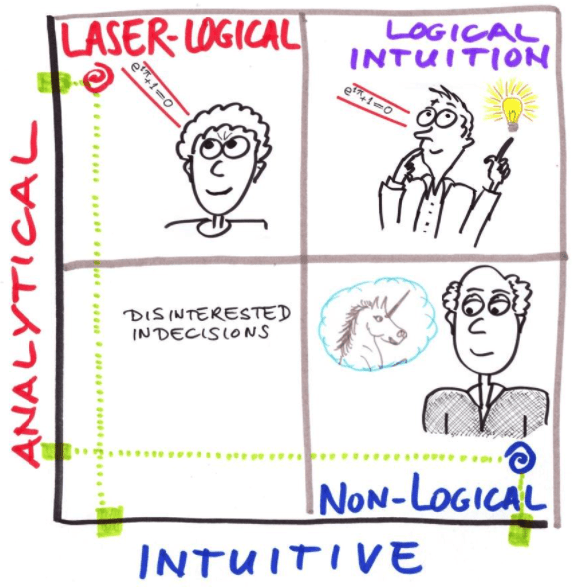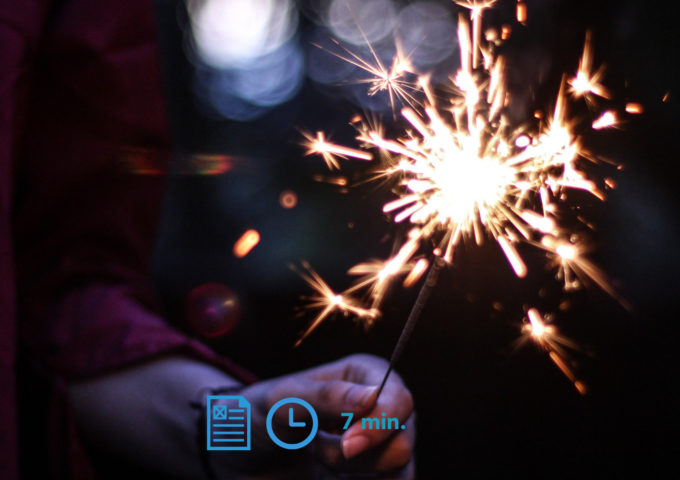
READ: What is better logic or intuition?
 How effective is your decision making? Do you have a preference for logic and working out the rationale or do you prefer to use your intuition and your gut feeling? There is now a lot of research that shows the limitations of both these approaches and it is interesting to identify our natural preference so we can compensate for and avoid the imbalance of relying too much on one or the other.
How effective is your decision making? Do you have a preference for logic and working out the rationale or do you prefer to use your intuition and your gut feeling? There is now a lot of research that shows the limitations of both these approaches and it is interesting to identify our natural preference so we can compensate for and avoid the imbalance of relying too much on one or the other.
Is there a sixth sense?
In his excellent book ‘Thinking Fast and Thinking Slow’ Daniel Kahneman retells the terrifying story of a team of firemen who were in the kitchen of a house that was on fire. While hosing down the kitchen the Commander found himself yelling “Get out of here now!” without realising why. The whole floor of the kitchen collapsed almost immediately after the firefighters escaped. It was only afterwards that the Commander recalled that the fire had been unusually quiet and that his ears had been unusually hot. He had no idea what was wrong but these impressions prompted what he called a ‘sixth sense’. It turned out that the heart of the fire was not in the kitchen but in the basement beneath where the men had stood.
This is a dramatic example of an expert using intuition to save lives. However, relying on your gut feelings for all decision-making can lead to being very reactive and at the mercy of your emotions. The brain is very heavily influenced by the amygdala which is responsible for emotions, survival instincts and memory. It is interconnected to many parts of the brain and can be both helpful and unhelpful depending on the situation. In the classic fight or flight situation mentioned above it is particularly useful, but in normal day to day work there are many times when it will be triggered by pressure, an imagined threat or even a particular phrase or tone that relates to old memories from childhood. These feelings need to be recognised for what they are so we can manage and inhibit them in an appropriate manner – if we don’t, our behaviour can become very illogical and even irrational.
Don’t rely on one mode of thinking
I find that a lot of entrepreneurs use their gut feelings when selecting people for jobs. They tend to like people who are like them. This frequently ends up in stress and frustration because the very people they need to run their business and implement their strategy are, more often than not, very unlike them!
However, if we rely on logic and analysis all the time we can neglect the answer to the very problem we are trying to solve, because we are so laser-focussed that we are unable to hear the ‘still quiet voice’ that prompts us to do something different. There are many examples of ultra-rational scientists spending long hours (if not years) on a particular problem, only to have a breakthrough when they were in a very serene, relaxed and peaceful state and not even thinking specifically about the problem.
I recently had a problem with my desktop while working on my hobby of photography. I was selecting and editing photos using a 2Tb external hard drive because the internal hard drives on my desktop were almost full. When I deleted a small subfolder that I no longer wanted, the main folder I was working in disappeared! Somehow the 42Gb of all my Australian holiday photos and videos were wiped off the disk. I checked and double checked but the main folder was gone. I was convinced that it was deleted outright because my logic told me the data could not be in the recycle bin; there was no space on the internal drives. So I was sure I had lost the lot.
I was deeply saddened and reconciling myself to the fact that I’d lost some great photos of Sydney and video clips of diving on the Great Barrier Reef, but my intuition told me not to switch anything off. I left the external drive and my desktop running for 2 days over a long weekend until I could contact my IT specialist. He promptly pointed me to the recycle bin and I was amazed to find the Australia folder there. My logical mind had created a belief that it couldn’t be there (because there was no space on the internal hard drive) and this had prevented me even looking! I was delighted to have the folder back and I learnt a bit about my computer and a lot about my intuition and the danger of logical beliefs. The stress of the situation and my logic had prevented me looking for the obvious and simple solution.
The key lesson for me was that my intuition told me not to switch anything off, not even the external hard drive and that had saved everything. John my IT specialist explained that if it had been turned off it would have fulfilled the ‘instruction’ that was encoded in the recycle bin to delete the folder. Fortunately I listened carefully to my intuition. So while all the files were marked for deletion, and were no longer visible or accessible on the external drive, I was able to reverse this by ‘restoring’ the folder from the recycle bin.
The Paradox of Decisions
 There is an interesting paradox in our approach to decisions. There needs to be a balance between being analytical and intuitive. Relying on one or the other can lead to an imbalance that will prevent getting to the best solution or making the best decision. This paradox is neatly illustrated in the Harrison Assessment Paradox Report (see the image to the right) and could be summarised by the proverb; “Use your logical mind to work out your day to day issues, but use you inner vision to guide your direction”.
There is an interesting paradox in our approach to decisions. There needs to be a balance between being analytical and intuitive. Relying on one or the other can lead to an imbalance that will prevent getting to the best solution or making the best decision. This paradox is neatly illustrated in the Harrison Assessment Paradox Report (see the image to the right) and could be summarised by the proverb; “Use your logical mind to work out your day to day issues, but use you inner vision to guide your direction”.
The two main traits in this Paradox are:
Analytical: The tendency to logically examine facts and problems, and
Intuitive: The tendency to use ‘hunches’ to help make decisions. Some clients have baulked at the term ‘hunch’ because they perceive it as ‘guessing’. However, in this context it uses the Concise Oxford Dictionary definition of premonition or intuitive feeling.
Analysis and intuition are actually mental powers used to gain understanding and insight. They are not mutually exclusive. The analytical processes use the left half of the brain and the intuitive processes use the right half of the brain. Analytical thinking is beneficial for complex problems when logic is required. However, some situations have many unknown (or unknowable) variables and therefore require intuitive decisions.
If there is an imbalance where we have strong ‘Analytical’ but low ‘Intuition’ we become ‘Laser Logical’. This can give us a one-track mind with tunnel-focus that can miss the subtle interconnections and memories of the millions of mental maps that are stored in our brain. For example a very quiet voice, like a distant memory, was telling me not to switch off my desktop or disconnect the hard drive – perhaps it was a memory below my conscious awareness. But my logical mind prevented me from looking in the obvious place – the recycle bin.
If there is an imbalance where we have strong ‘Intuition’ but low ‘Analytical’ contrasting we get ‘Non-logical’ thinking and behaviour, this can be seen as ungrounded or superstitious. If both of these traits are low we become a ‘Disinterested Decision-maker’ who is neither ‘Analytical’ nor ‘Intuitive’. This can lead to insufficient investigation of issues before making decisions.
A person with strength in both of these traits has ‘Logical Intuition’; they can simultaneously make use of both sides of their brain by being equally ‘Analytical’ and ‘Intuitive’. They avoid the limitations of being narrowly logical (‘Laser Logic’) by learning to explore hunches, inner feelings and the ‘quiet voice’ inside. They also avoid the pitfalls of being ‘Non-logical’ by using their rational mind to evaluate, verify and explain their intuitive thoughts and feelings. The ‘Logical Intuitive’ person incorporates both the capacities of analysis and intuition in order to make effective decisions.
Are there gender differences?
There is still a lot of debate in certain circles about the perceived gender differences between men and women, with men being supposedly more logical and women being more intuitive. While some studies show that there are more connections between brain hemispheres in women and more connections from the front to the back in each hemisphere in men, there are many caveats and problems with the sample size and subject age in these studies. The brain still holds many mysteries, so for now all we can say for sure is that the differences between the brain in any man and woman are as wide ranging as any man and another man or a woman and another woman. This is mainly due to the infinite variables that affect brain development throughout our lives. Of course this is only valid until a study comes along to refute it!
The concept behind these Paradoxes allows us to explore the principles of the opposing traits and how we can exercise more of both. It is not about doing less of what you naturally prefer; it is about looking at any imbalances and learning ways to improve the balance between them. This can be achieved by greater self-awareness, being open to feedback and a willingness to improve.
So I invite you to explore your preferences and the preferences of your directors and managers. How do you, and the teams you are a member of, go about making decisions? What will you need to do in order to exercise more ‘Logical Intuition’ and have more ‘Balanced Versatility’ in your approach?
If you are interested in exploring where you and your managers stand on this Paradox and the eleven other Paradoxes in the assessment just contact Gloria at info@talent4performance.co.uk.
Remember . . . stay curious!
David Klaasen
©David Klaasen – May 2016



